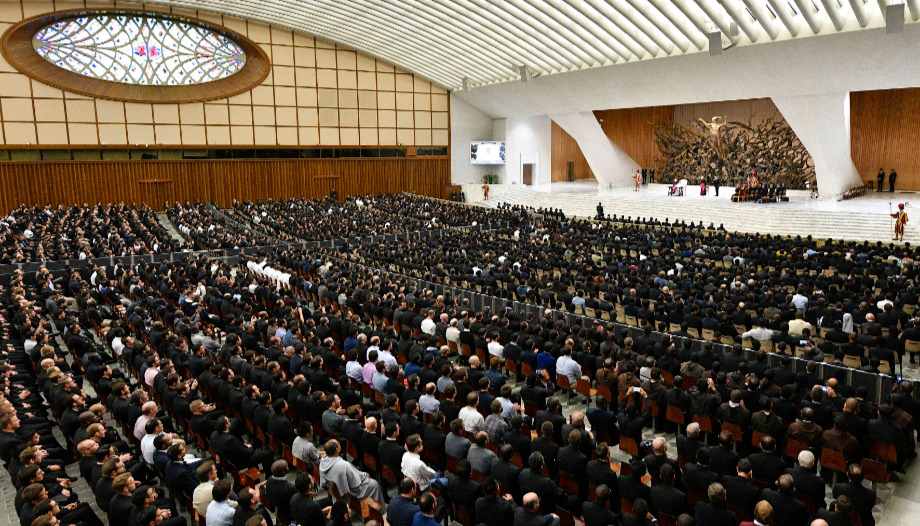On January 9, the new "Guidelines and norms for the formation of priests in seminaries" promulgated by the Italian Bishops' Conference came into force. The text approved during the 78th General Assembly of the episcopal body held in Assisi in November 2023, was made official by decree of Cardinal Matteo Maria Cardinal Zuppi on January 1, 2025 of this year.
As indicated in the presentation, this is an updating stage, the fruit of a process of listening and reflection, which introduces important new features with respect to the previous edition of 2006, harmonizing the requirements of the universal Church, in particular those arising from the recent Synod of Bishops, with the peculiarities of the Italian context.
Between continuity and renewal
Evidently, the new text is born in dialogue with the "Ratio Fundamentalis Institutionis Sacerdotalis," promulgated by the Congregation for the Clergy in 2016. With a vision oriented toward synodality and missionary work, therefore, it aims to respond to two fundamental questions: what kind of priest to form in the near future and for what "type" of Church. The result is a normative framework that renews the model of seminary life, making it more flexible and adapted to the needs of candidates and communities.
The four stages of the formative itinerary-propaedeutic, discipleship, configurational and vocational synthesis-remain central, but greater emphasis is placed on the personalization of times and objectives. The document, in fact, stresses the need for ongoing discernment and integral accompaniment, which takes into account the human, spiritual, intellectual and pastoral dimensions of the candidate for the priesthood, as in fact has been repeated in many of Pope Francis' meetings precisely with priests and seminarians.
Formative stages
Special attention is given to the propaedeutic stage, conceived as a preliminary period to verify the vocation and develop a solid spiritual and human foundation. This time of discernment, which lasts one or two years, is lived in a community separate from the Major Seminary, in order to allow the young men to deepen their journey without pressure.
The other phases of the formative itinerary - discipleship, configuration and vocational synthesis - are reinterpreted with a more dynamic and adaptable approach to current social changes. The direct involvement of Christian communities in the formative itinerary of seminarians, which has already begun in many Italian dioceses, is also encouraged.
Special interest is given, for example, to the presence of educational teams composed of lay people, religious and families. The spirit of this approach is precisely to promote greater synodality and strengthen the bond between future priests and the People of God.
The challenges of social networks
One of the interesting aspects of the new guidelines refers to the impact of social networks on the life of seminarians and future priests. It reiterates how the digital era offers great opportunities for evangelization, but also exposes risks such as fragmentation of identity, superficiality in relationships and loss of critical capacity.
Hence the need to prepare seminarians to develop a digital maturity that will enable them to consciously inhabit this specific "world" as well. This includes the responsible use of social networks as a pastoral tool, while at the same time avoiding that they replace or impoverish personal relationships. The formative proposal encourages a balance between online presence and moments of prayer, reflection and community life, so that future priests can also offer an authentic witness online.
A Church on the way
The approval of the guidelines comes at a time when the Italian Church is in the midst of its own "The Italian Church in the midst of its own "synodal journey"The text, which began in the wake of that of the universal Church and now continues to "ground" the fruits of these years of exchange and reflection, is not intended to be a mere set of norms, but rather an open and dynamic guide, ready to welcome the changes that the ecclesial and cultural reality demands. At the same time, it is specified that the text does not intend to be a mere set of norms, but an open and dynamic guide, ready to welcome the changes that the ecclesial and cultural reality demands. This was reiterated by the Bishop of Fiesole, Stefano Manetti, President of the Episcopal Commission for the Clergy and Consecrated Life and author of the text presenting the new Ratio, in an interview granted to the Italian Episcopal Conference's newspaper Avvenire.
Thus, the guidelines reflect a vision that integrates initial formation and ongoing formation, considering the two moments as inseparable parts of a single "discipleship process". In this way, formators are invited to support seminarians in recognizing the signs of God's presence in their daily lives, promoting an ongoing discernment that will make them authentic pastors with a profound missionary character.
Controversy over the admission of persons with homosexual tendencies
The Avvenire newspaper, owned by the Italian Episcopal Conference, has come out against the controversy generated by some media's interpretation of these new norms for Seminaries. According to the newspaper, the Church's norms on the non-admission of homosexuals to the priesthood have not changed and remain aligned with previous documents, such as the 2016 Ratio Fundamentalis. The text emphasizes that candidates with deep-seated homosexual tendencies or who support gay culture are not admitted, consistent with the Magisterium.
The novelty of the document lies in the focus on personal discernment, especially in the first three years of formation, seeking an integral understanding of the candidate's personality. However, it is clarified that this approach does not imply changes in the criteria for admission, but rather an emphasis on helping future priests to discover the truth about themselves and to live chastity as a gift.
Some media have erroneously interpreted the document as an opening towards the admission of homosexual priests, as long as they live in chastity, something denied by the ecclesiastical authorities. Avvenire denounces the decontextualization and manipulation of the text by certain media, which seek to sow confusion about the position of the Church.







